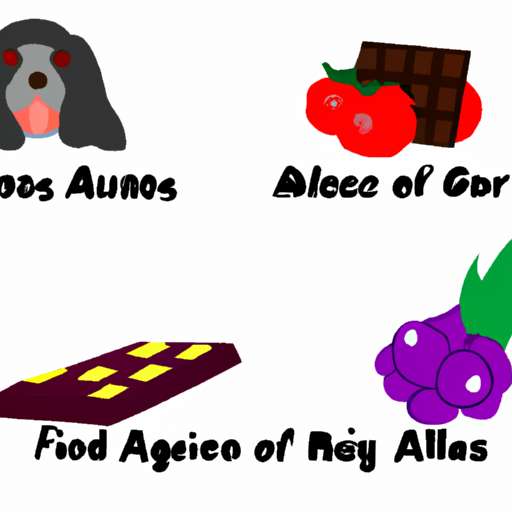As a caring pet owner, you’re probably aware that some foods that are okay for humans to consume can be potentially harmful, even deadly, for dogs. In this article, we’ll delve into eight types of foods that your canine companion should avoid, why these foods are dangerous, and what to do if your dog accidentally consumes any of them.
1. Chocolate and Caffeine
Chocolate and caffeine are two items high on the list of foods dogs should not eat. Both contain substances called methylxanthines, which are toxic to dogs.
| Food | Substance | Symptoms |
|---|---|---|
| Chocolate | Theobromine | Vomiting, diarrhea, rapid breathing, increased heart rate, seizures |
| Caffeine | Caffeine | Restlessness, rapid breathing, heart palpitations, muscle tremors, fits, bleeding |
In case of accidental consumption, it’s important to contact your vet immediately.
2. Grapes and Raisins
Grapes and raisins may seem harmless, but they can cause kidney failure in dogs. Even a small amount can make a dog ill.
- Vomiting
- Lethargy or weakness
- Depression
- Decreased appetite
- Abdominal pain
If your dog shows any of these symptoms after eating grapes or raisins, seek veterinary assistance right away.
3. Onions and Garlic
Onions and garlic can cause damage to your dog’s red blood cells, leading to anemia. This is true for all forms of onions and garlic, including powdered, raw, cooked, or dehydrated.
Symptoms of anemia include:
- Weakness
- Vomiting
- Breathlessness
- Loss of interest in food
4. Alcohol
Alcohol has the same effect on a dog’s liver and brain that it has on humans. But it takes far less to do its damage. Just a little beer, liquor, wine, or food containing alcohol can be harmful.
Signs to look out for include:
- Vomiting
- Diarrhea
- Difficulty breathing
- Central nervous system depression
- Coordination problems
- Coma
If your dog has consumed alcohol, contact your vet immediately.
5. Xylitol
Xylitol is a sugar substitute that’s often found in sugar-free gum, candy, baked goods, and toothpaste. While it’s safe for humans, it’s extremely toxic for dogs and can lead to hypoglycemia and liver failure.
Watch out for symptoms such as:
- Loss of coordination
- Vomiting
- Lethargy
- Collapse
- Seizures
If you suspect xylitol poisoning, immediate veterinary care is required.
6. Raw/Undercooked Meat and Eggs
Raw meat and raw eggs can contain bacteria such as Salmonella and E. coli, which can be harmful to pets. In addition, raw eggs contain an enzyme called avidin that decreases the absorption of biotin, which can lead to skin and coat problems.
7. Salty Foods
Too much salt can produce excessive thirst and urination, or even sodium ion poisoning in pets. Signs that your pet may have eaten too many salty foods include:
- Vomiting
- Diarrhea
- Depression
- Tremors
- Elevated body temperature
- Seizures
8. Nuts
Nuts, including almonds, pecans, and walnuts, contain high amounts of oils and fats. The fats can cause vomiting and diarrhea, and potentially pancreatitis in pets.
FAQs
Q: What should I do if my dog eats something harmful?
A: If your dog ingests a harmful substance, contact your vet or a pet poison control center immediately.
Q: Can I give my dog any human food?
A: Some human foods are safe for dogs in moderation, but it’s always best to consult with your vet before introducing new foods into your dog’s diet.
Q: Are any fruits or vegetables harmful to dogs?
A: Certain fruits and vegetables, like grapes, onions, and garlic, are harmful to dogs. Always check if a food is safe before giving it to your pet.
Q: My dog ate chocolate but seems fine. Should I still see a vet?
A: Yes, symptoms might not appear immediately. It’s better to be safe and consult a vet right away.
Remember, when it comes to your dog’s health, it’s always better to be safe than sorry. Always keep these harmful foods out of your pet’s reach and consult with your vet if you have any concerns.



